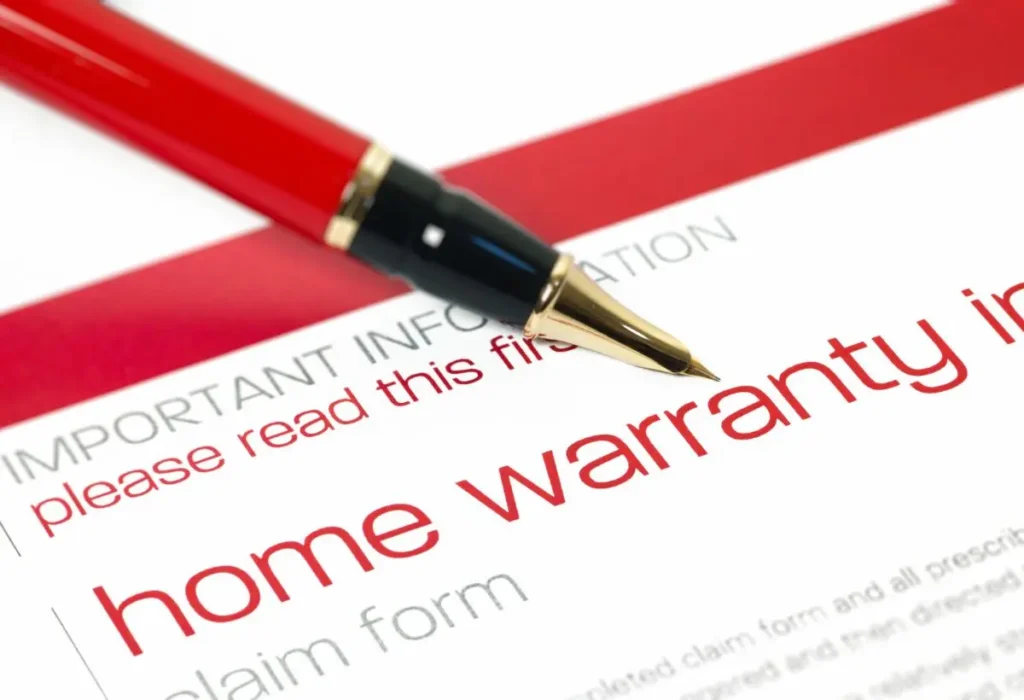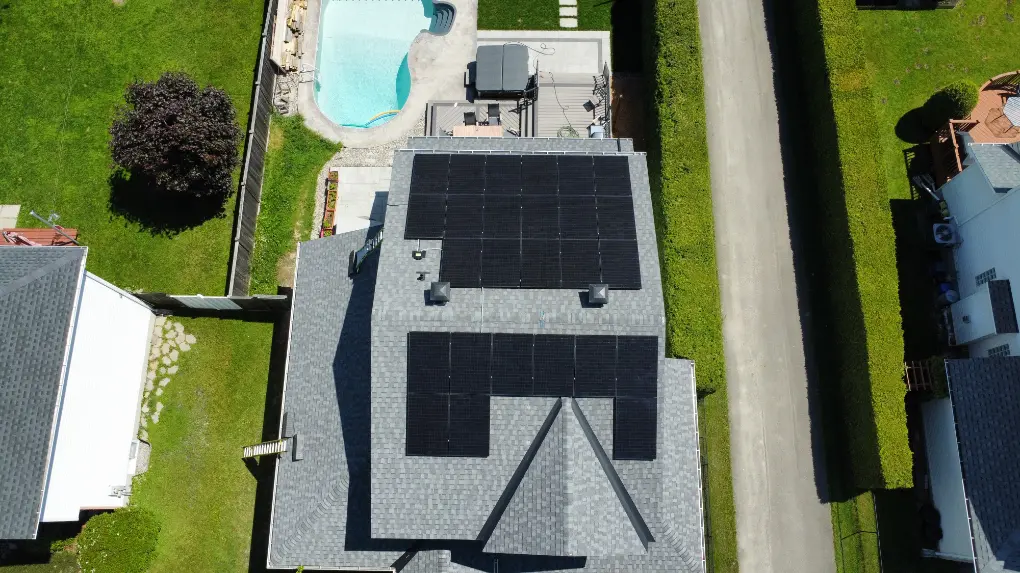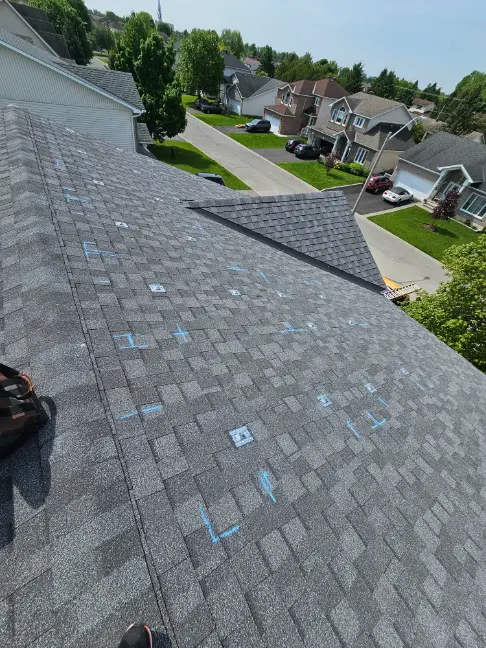If you own a home and you’re thinking about adding solar panels, there’s something important you should know.
Can solar panels mess up your roof warranty?
It’s a good question. Your roof keeps your home safe. A warranty helps cover repairs if something goes wrong. So when solar panels are bolted right into the roof, it’s fair to wonder if that might cause issues.
Here’s the straight answer:
Your warranty can stay in place — as long as the panels are put in the right way.
At True Beacon, we take care of both the electrical side and the roofing side of solar installs. Our team has the licenses and training to do the job by the book. We use the right tools and methods to keep your roof strong and your coverage intact.
In this article, we’ll break down what to check before adding solar, how the panels connect to your roof, and what steps help avoid costly problems later.
Let’s walk through it, one step at a time.

What Your Roof Warranty Covers
Before you get solar panels, it’s smart to know what your roof warranty includes. Most homes in Canada have two kinds of roof warranties.
The manufacturer’s warranty is from the company that made the roofing materials, like shingles. It usually lasts 20 to 30 years.
The workmanship warranty is from the company that put the roof on your house. It covers mistakes made during the roof work. This one usually lasts 5 to 10 years.
You can lose these warranties if someone works on your roof the wrong way. This can happen if they drill holes or add parts without doing it right.
If solar panels are not installed the right way, the warranty may not help you later. That’s why it’s important to hire someone who knows how to do it properly.

How Solar Panels Go on Your Roof
Solar panels don’t just sit on your roof. They need to be firmly attached. This happens through a system that bolts into your roof to hold everything in place.
Now, if this is done the wrong way, it can cause trouble — like leaks, damage, or your roof’s warranty being taken away. But if it’s done the right way, your roof stays safe and strong for years.
Here’s how good installers do it:
- Flashing is added around the spots where the bolts go in. This helps rainwater slide off instead of slipping through.
- Sealants are used to fill any small gaps so water doesn’t sneak in.
- Good spacing between the panels keeps air moving and stops water or leaves from getting stuck underneath.
If your roof is made of standing seam metal, you might not need to drill at all. Installers can use clamps to grip the seams, which means no holes in your roof — and your warranty is usually still fine.
The way your panels are installed matters a lot. Done right, they protect your home without causing future headaches.
How Solar Panels Can Void a Roof Warranty
A roof warranty won’t just disappear on its own. But it can be lost if the job isn’t done with care.
Say the installer skips flashing. Or uses the wrong sealant. Or damages a few shingles along the way. That’s where things start to go wrong.
Most roofing companies have clear rules. If someone changes the roof without following the instructions, the warranty may no longer apply. That includes solar work too.
Think of your roof like a tightly sealed box. It keeps the weather out. But once someone pokes a hole in it and patches it the wrong way, that box may never be the same. And if it leaks later, the company that gave you the warranty might not be willing to fix it.
That’s why how the panels are put on matters just as much as the panels themselves.
How to Keep Your Roof Warranty Safe
Here’s how to keep your roof protected when you install solar panels:
- Work with certified experts. At True Beacon, we’re fully licensed (ESA #7016796) and certified to design and install solar systems.
- Talk to your roofer if your roof is covered by a warranty. We can work together with them.
- Keep records of everything. This includes checks on the structure before the install and final pictures and papers after.
- Replace your roof first if it is old. If your roof is 10 to 15 years old, think about getting a new roof before going solar. Panels last over 25 years—you want your roof to last as long too.

Is Your Roof Ready for Solar?
Thinking about going solar? First, look up. Your roof has to be in good shape before anything else happens.
Let’s walk through what to check.
Asphalt Shingles
They’re everywhere, and for good reason—they get the job done. But they wear down with time. Around Ottawa, you can expect about 20 years of use.
If your shingles are already 5 to 7 years old, or you notice curling, cracks, or bare spots where granules have worn off, it might be time to think about a new roof. Better to handle it now than deal with taking off panels later.
Steel Roofs
Steel lasts a long time. In many cases, 40 to 70 years. It holds up through snow, ice, and the constant freezing and thawing that Ottawa sees every year. If you already have metal up there, chances are you’re good to go.
What a New Roof Might Cost Around Ottawa
Here’s what homeowners around the region usually pay:
- Asphalt shingles (single-family home): $15,000–$20,000
- Steel shingles: $23,000–$27,000
- Standing seam metal roofing: $35,000–$40,000
- Plywood repair, if the boards underneath need replacing: $4,000–$5,000
It’s not small money, but replacing a roof before you install panels can save you thousands in the long run. Doing it after means you’re also paying to remove and reinstall the solar system.
What Roofers Check Before Giving the Go-Ahead
A real roof check isn’t just about what you see from the street. It means looking at both the top of your house and the space beneath it.
Outside, here’s what they’ll look for:
- Shingles that are missing, curling, or breaking apart
- Grit and granules are piling up in your gutters
- Nails sticking up or decking that feels soft underfoot
- Signs that water’s been leaking near skylights or vents
In your attic, they’ll check for:
- Damp insulation that clumps together or looks dark
- Mold on the wood above your head
- Airflow problems — often caused by blocked or missing vents
Tip from the pros: Still using older plastic vents? Swap them out for steel tower vents. Brands like Maximum are known for holding up better in snow and keeping air moving, which helps stop ice from building up at the edges of your roof.
And this is key: Don’t let anyone put panels right over chimneys, vents, or skylights. It blocks access, messes with airflow, and makes future repairs way harder than they need to be.
How True Beacon Looks Out for Your Roof
When you choose True Beacon, you’re not just hiring someone to bolt panels to your roof. You’re working with a crew that looks at the whole picture.
Here’s what we bring to every job:
- Licensed electricians and certified solar installers — no shortcuts, no guesswork
- Waterproofing and flashing done the right way to keep out leaks
- Full roof checks before we even start — we look at the surface and the structure underneath
- We’ll talk to your roofer, if needed, so everyone’s on the same page
- We provide detailed paperwork you can use for your warranty or insurance
- And we stand by our work with a 5-year workmanship warranty
We also keep it honest. If your roof’s not ready, we won’t move ahead. We’ll walk you through your options and help you figure out what comes next. No pressure. Just straight answer
Good Questions to Ask Your Solar Installer
Before you agree to anything, it’s smart to ask a few clear questions. No matter who you’re working with, these are the things you’ll want to know:
- How old can my roof be before I need to replace it for solar?
- Could this install affect any part of my roof warranty?
- Do you have photos of past jobs on homes like mine?
- Will you move vents if they’re in the way? Will you swap them out if needed?
- What kind of documents will I get when the work is done?
Don’t be afraid to ask these things. A good installer will have no problem walking you through the answers.
What Makes Ottawa Homes Different
Ottawa isn’t the easiest place for roofs. Winters get heavy with snow. Summers bring heat and moisture. And many homes here are older or have custom features.
We’ve worked across the region—from narrow townhouses in Barrhaven to big countryside homes near Limoges—and we’ve seen it all.
Here’s what matters most around here:
- Roofs need to hold snow without sagging
- Asphalt can crack and wear down from freezing and thawing
- Older homes often need better attic airflow
We keep all of that in mind when we plan a solar setup.
We keep all of that in mind when we plan a solar setup. And it’s no surprise that Ontario leads the country in solar capacity, accounting for over 50% — and growing.
Before You Go Solar: A Quick Checklist
Take a few minutes to go through this list before you make any decisions:
- Check your roof—look outside and in the attic
- Know how old it is and how much life it has left
- Think about replacing it if it’s starting to wear out
- Don’t block chimneys, skylights, or roof vents with panels
- Hire someone with the right licenses
- Ask for all paperwork and keep it
- Look into better attic vents if yours are old or missing
The shift to clean power is part of a bigger picture. Canada aims for a 50% renewable energy mix by 2030, and solar is a big part of that.
Ready to Start — and Do It Right?
We’re not just here to bolt panels to your roof. At True Beacon, we look at the whole picture—so your home stays protected and your warranty stays solid.
Give us a call and we’ll take a look at your roof, answer your questions, and walk you through the next steps.
Call 613-701-1028
Or visit truebeacon.ca to book your free roof and solar check-up.
Frequently Asked Questions
How long should I wait to add solar after getting a new roof?
In most cases, you can install solar just a few weeks after the new roof is finished. That gives the materials time to settle. Still, it’s smart to ask your roofer. Some may suggest waiting a bit longer, depending on the weather or the type of shingles used.
Can solar panels cause my roof to leak?
They shouldn’t. Leaks usually come from poor work—like skipping the flashing or not sealing things right. A trained installer who knows what they’re doing will get it right the first time.
If I sell my house, will the roof warranty still apply?
Sometimes, yes. Some warranties can move to the next owner. But if you added solar panels, you’ll need records that show they were installed the right way. Save your paperwork—it makes things easier down the road.
How do I know if my roof warranty covers solar panel installation?
To find out if your roof warranties cover solar panel installation, check your current warranty documents and talk to the manufacturer. Make sure your warranty is still valid after the installation process. Also, ensure that your solar panel installer follows all the manufacturer’s rules for installation.
What should I look for in a solar contractor to avoid problems with my roof?
Choose a solar contractor with roofing experience, not just solar installation. Someone who understands shingle roofs and how to mount panels without causing damage will help protect your roof integrity.
Can solar energy systems damage my roof?
Solar energy systems are safe for your roof if installed properly. But improper installation or working with solar companies that cut corners can lead to defective shingles, leaks, or other issues.
What are the potential risks of incorrect installation?
Incorrect installation can cause a lot of problems—loose panels, water damage, or even lifting shingles off the roof. It’s important to work with solar companies that follow all safety steps to avoid these potential risks.
What steps should I take if my roof is damaged during solar panel installation?
If your roof gets damaged because it was not installed correctly, reach out to your roofing contractors and solar provider right away. Take notes on all the damaged roof shingles and roofing products. Also, look at your warranty coverage to find out if repairs or replacements are covered by workmanship or materials warranties.
Can I upgrade my solar system without affecting the roof warranty?
Yes, you can usually upgrade your solar system without losing your roof warranties. This is true if you use proper installation methods. Always talk to your installer and your existing warranty provider. This way, you can make sure that the changes will not affect your coverage.
Are there specific solar panel brands that are known to be safer for roofs?
Some solar panel brands are suggested by roofing manufacturers. This is because these brands work well with their installation methods. This helps keep the roof safe and protects roofing warranties. It is important to check with your roofing manufacturer for the recommended solar panel brands and installation techniques.